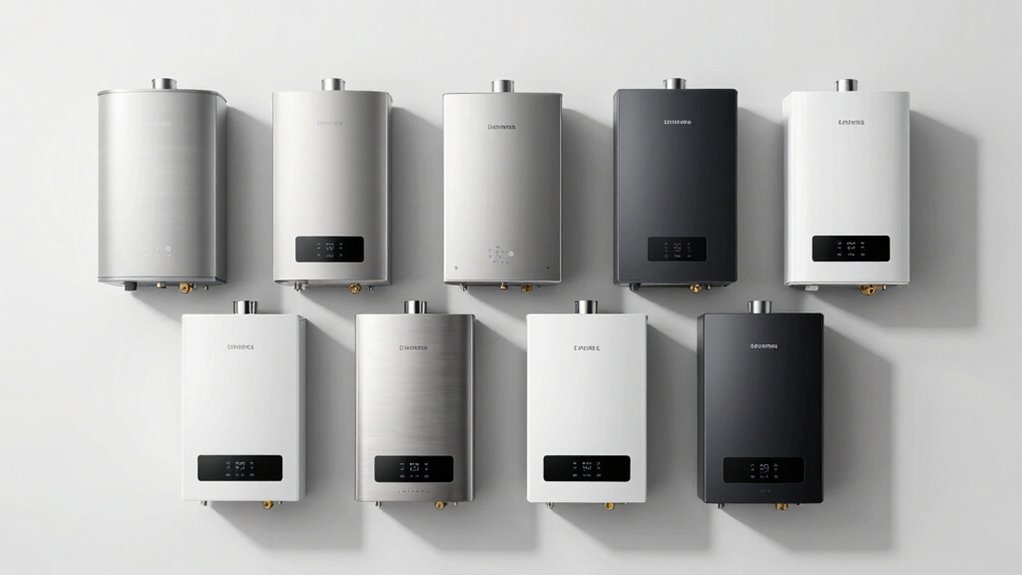Lithium batteries offer superior performance for your off-grid power system. You'll benefit from their high energy density, longer lifespan, and faster charging capabilities. These batteries are lightweight and compact, making them ideal for space-constrained applications. With a low self-discharge rate, they're reliable for emergencies and require minimal maintenance. Lithium batteries scale easily for future expansion and integrate seamlessly with renewable energy sources. While initially more expensive, they're cost-effective in the long run due to their extended lifespan and efficiency. Plus, they have a lower environmental impact compared to traditional lead-acid batteries. Discover how lithium can revolutionize your off-grid power setup.
Superior Energy Density

When comparing energy storage options for off-grid power systems, lithium batteries stand out due to their superior energy density. This means you'll get more power storage capacity in a smaller, lighter package compared to traditional lead-acid batteries. For off-grid applications, where space and weight are often at a premium, this advantage can't be overstated.
Lithium batteries typically offer 3-4 times the energy density of lead-acid batteries. This translates to considerably more usable capacity in the same physical footprint. You'll be able to store more energy for your off-grid system without sacrificing valuable space or adding excessive weight to your setup.
The high energy density of lithium batteries also means you'll need fewer batteries to achieve your desired storage capacity. This can simplify your system design, reduce installation complexity, and potentially lower overall costs.
Additionally, the compact nature of lithium batteries makes them ideal for portable off-grid applications, such as RVs, boats, or mobile power stations. You'll enjoy greater flexibility and mobility without compromising on power storage capabilities.
Longer Lifespan
When you choose lithium batteries for your off-grid power system, you'll benefit from their markedly longer lifespan compared to traditional lead-acid batteries.
You can expect lithium batteries to endure more charge-discharge cycles and handle deeper depths of discharge without compromising their performance.
Additionally, you'll notice reduced capacity degradation over time, ensuring your power system remains efficient for years to come.
More Charge-Discharge Cycles
Lithium batteries offer a considerably longer lifespan compared to traditional lead-acid batteries. This extended longevity is primarily due to their ability to withstand more charge-discharge cycles. While a typical lead-acid battery might last for 300 to 500 cycles, a high-quality lithium battery can endure 2,000 to 5,000 cycles or more.
You'll find that this increased cycle life translates directly into years of reliable service. In an off-grid power system, where you're likely to charge and discharge your batteries daily, lithium batteries can last 5 to 10 years or even longer. This longevity means you won't need to replace your batteries as frequently, saving you money and reducing waste in the long run.
Moreover, lithium batteries maintain their performance throughout their lifespan. Unlike lead-acid batteries, which can lose capacity over time, lithium batteries retain their ability to hold a charge even after thousands of cycles.
This consistency guarantees that your off-grid power system remains efficient and reliable year after year, providing you with a stable energy source for your home or remote location.
Deeper Depth of Discharge
Another significant advantage of lithium batteries in off-grid power systems is their deeper depth of discharge (DoD).
Lithium batteries can be discharged to a much lower level than traditional lead-acid batteries without damaging their capacity or lifespan. While lead-acid batteries typically shouldn't be discharged below 50% to maintain their longevity, lithium batteries can safely be discharged to 80% or even 90% of their capacity.
This deeper DoD means you can use more of the battery's stored energy before needing to recharge, effectively increasing the usable capacity of your off-grid power system. For example, a 100Ah lithium battery with an 80% DoD provides 80Ah of usable energy, whereas a 100Ah lead-acid battery with a 50% DoD only offers 50Ah of usable energy.
The ability to discharge lithium batteries more deeply also allows for a smaller battery bank, saving you space and money.
You'll need fewer batteries to meet your power needs, reducing the overall size and cost of your off-grid system. This feature makes lithium batteries particularly attractive for applications where space is limited or weight is a concern, such as in RVs or boats.
Reduced Capacity Degradation
Remarkably, one of the most significant advantages of lithium batteries for off-grid power systems is their reduced capacity degradation over time. Unlike traditional lead-acid batteries, which can lose capacity rapidly, lithium batteries maintain their performance for much longer periods. This means you'll get more usable energy from your battery bank throughout its lifespan.
Lithium batteries typically retain 80% or more of their original capacity after thousands of cycles, whereas lead-acid batteries may drop below 50% capacity in just a few hundred cycles. This slower degradation translates to a longer overall lifespan for your off-grid power system. You won't need to replace your batteries as frequently, saving you money and reducing waste in the long run.
The reduced capacity degradation of lithium batteries also guarantees more consistent performance. You'll experience less voltage drop during discharge, providing stable power output for your off-grid applications. This reliability is essential for maintaining your energy independence and making certain your system meets your power needs year after year.
Faster Charging Capabilities

Rapid recharge times are a standout feature of lithium batteries in off-grid power systems. You'll find that lithium batteries can charge up to five times faster than their lead-acid counterparts. This means you'll spend less time waiting and more time using your power system at full capacity.
When you're relying on intermittent energy sources like solar or wind, fast charging becomes essential. Lithium batteries can efficiently capture and store energy during brief periods of generation, ensuring you don't miss out on valuable power. Their ability to accept high charging currents allows you to make the most of available energy, even during short bursts of sunlight or gusty winds.
To better understand the impact of faster charging, imagine:
- Your solar panels capturing a sudden burst of sunlight between clouds
- A windmill spinning rapidly during a short gust
- A microhydro system surging after heavy rainfall
- A backup generator running for just a few minutes
In each scenario, lithium batteries excel at quickly absorbing and storing that energy, maximizing your system's efficiency and reducing waste.
This rapid charging capability translates to improved reliability and performance for your off-grid power setup.
Lightweight and Compact Design
While charging speed is impressive, lithium batteries' physical attributes offer distinct advantages for off-grid power systems. You'll find that lithium batteries are considerably lighter and more compact than their lead-acid counterparts. This reduced weight and size make them ideal for portable or space-constrained applications.
When you're designing an off-grid power system, every inch and pound matters. Lithium batteries allow you to maximize your available space, fitting more capacity into a smaller area. You'll appreciate this feature when installing batteries in tight spaces like RVs, boats, or small cabins.
The lightweight nature of lithium batteries also makes transportation and installation easier, reducing labor costs and physical strain.
Moreover, the compact design of lithium batteries enables you to create more flexible and scalable power systems. You can easily add or remove batteries as your energy needs change, without worrying about excessive weight or space requirements.
This adaptability is particularly valuable in off-grid scenarios where your power needs may fluctuate over time. By choosing lithium batteries, you're investing in a power solution that's not only efficient but also physically suited to the demands of off-grid living.
Low Self-Discharge Rate

In addition to their compact design, lithium batteries boast an impressively low self-discharge rate. This means they'll retain their charge for much longer periods when not in use compared to other battery types. You'll find this particularly beneficial for off-grid systems where you mightn't use your stored energy for extended periods.
Lithium batteries typically lose only 1-3% of their charge per month when idle, compared to 15-20% for lead-acid batteries. This low self-discharge rate offers several advantages:
- Longer shelf life, allowing you to store backup batteries without frequent recharging
- Reduced maintenance requirements, saving you time and effort
- Improved reliability during emergency situations when you need power most
- Lower overall energy waste, increasing the efficiency of your off-grid system
You'll appreciate the peace of mind knowing your lithium batteries will be ready when you need them, even after months of inactivity.
This reliability is vital for off-grid living, where consistent power availability is fundamental. The low self-discharge rate of lithium batteries guarantees your energy storage remains stable and dependable, making them an excellent choice for your off-grid power system.
Minimal Maintenance Requirements
Lithium batteries stand out for their minimal maintenance requirements, making them ideal for off-grid power systems. Unlike traditional lead-acid batteries, you won't need to perform regular water top-ups or equalization charges with lithium batteries. This hands-off approach saves you time and effort, especially in remote locations where frequent maintenance can be challenging.
You'll also appreciate that lithium batteries don't require periodic cycling to maintain their health. They can sit at partial states of charge without suffering sulfation or other degradation issues common in lead-acid batteries. This means you can use your off-grid system as needed without worrying about damaging the batteries.
Lithium batteries' robust construction and advanced management systems further reduce maintenance needs. They're less susceptible to temperature fluctuations and can withstand deeper discharges without harm. You won't need to monitor voltage levels as closely or adjust your usage patterns to protect battery life.
The minimal maintenance of lithium batteries translates to lower long-term costs and increased reliability for your off-grid power system. You can focus on enjoying your sustainable energy setup rather than constantly tending to your batteries.
Wide Temperature Range Performance

When it comes to temperature performance, lithium batteries excel in a wide range of conditions. Unlike traditional lead-acid batteries, which can struggle in extreme temperatures, lithium batteries maintain their efficiency and capacity across a broader spectrum. This makes them ideal for off-grid systems in various climates, from scorching deserts to frigid mountain regions.
You'll appreciate lithium batteries' ability to perform in both hot and cold environments. In high temperatures, they resist thermal runaway and maintain stability. In cold conditions, they continue to deliver power when other battery types might fail. This wide temperature range performance guarantees your off-grid system remains reliable year-round.
To visualize the benefits, consider these scenarios:
- Your remote cabin in Alaska stays powered through -20°F winters.
- Your desert solar installation keeps running efficiently in 120°F heat.
- Your RV's power system functions seamlessly from Florida to Montana.
- Your boat's electronics remain operational in both tropical and arctic waters.
Higher Depth of Discharge
You'll appreciate lithium batteries' higher depth of discharge, which allows for a longer battery lifespan compared to traditional lead-acid options.
This feature increases your usable capacity, letting you extract more energy from the same battery size.
With efficient energy utilization, you'll maximize your off-grid power system's performance and reduce the need for frequent battery replacements.
Longer Battery Lifespan
With respect to longevity, lithium batteries outshine their lead-acid counterparts by a significant margin.
You'll find that lithium batteries can last up to 10 times longer than traditional lead-acid batteries, offering a lifespan of 3,000 to 5,000 cycles or more. This extended life translates to significant cost savings over time, as you'll need to replace your batteries less frequently.
The longer lifespan of lithium batteries is due to their superior chemistry and construction. Unlike lead-acid batteries, lithium batteries don't suffer from sulfation or grid corrosion, which are common causes of battery failure.
Additionally, lithium batteries maintain their performance throughout their lifespan, whereas lead-acid batteries gradually lose capacity over time.
To visualize the benefits of lithium's longer lifespan, consider these points:
- Reduced replacement frequency
- Lower long-term maintenance costs
- Consistent power output over time
- Decreased environmental impact due to fewer disposed batteries
Increased Usable Capacity
Lithium batteries stand out when it comes to usable capacity. Unlike lead-acid batteries, which typically allow you to use only 50% of their rated capacity, lithium batteries offer a much higher depth of discharge (DoD). You can safely utilize up to 80-100% of a lithium battery's capacity without risking damage or greatly reducing its lifespan.
This increased usable capacity means you'll need fewer lithium batteries to meet your power needs compared to lead-acid alternatives. For example, if you require 10 kWh of usable energy, you'd need about 20 kWh of lead-acid batteries but only 12.5 kWh of lithium batteries. This reduction in battery quantity not only saves space but also reduces overall system costs.
Moreover, lithium batteries maintain a steady voltage throughout their discharge cycle, ensuring consistent power output until they're nearly depleted. This characteristic allows you to use more of the stored energy effectively, improving your system's efficiency.
You'll also experience less voltage sag under heavy loads, which is particularly beneficial for powering high-draw appliances or equipment in your off-grid setup.
Efficient Energy Utilization
The higher depth of discharge offered by lithium batteries translates directly into more efficient energy utilization. Unlike lead-acid batteries, which typically allow only 50% depth of discharge, lithium batteries can be safely discharged up to 80-90% of their capacity. This means you'll get more usable energy from the same battery size, maximizing your system's efficiency.
When you choose lithium batteries for your off-grid power system, you're investing in a solution that allows you to:
- Power your appliances for longer periods without recharging
- Run more energy-intensive devices simultaneously
- Reduce the overall size and weight of your battery bank
- Minimize wasted energy and improve system performance
You'll find that lithium batteries maintain a steady voltage throughout their discharge cycle, ensuring consistent power output until they're nearly depleted. This characteristic allows you to use more of the stored energy without compromising performance.
Improved Safety Features

In terms of safety, modern lithium batteries for off-grid systems have made significant strides. You'll find that these batteries come equipped with advanced Battery Management Systems (BMS) that constantly monitor and regulate voltage, current, and temperature. This guarantees peak performance and prevents overcharging, over-discharging, and overheating.
Lithium batteries also offer improved safety features compared to traditional lead-acid batteries:
| Feature | Lithium | Lead-Acid |
|---|---|---|
| Thermal Runaway | Highly resistant | More susceptible |
| Venting | Minimal off-gassing | Hydrogen gas emission |
| Acid Spills | No risk | Potential hazard |
| Fire Risk | Low | Higher |
| Explosion Risk | Extremely low | Higher |
You'll appreciate that lithium batteries don't require ventilation, making them safer for indoor installation. They're also more stable during charging and discharging cycles, reducing the risk of accidents. Additionally, lithium batteries are sealed units, eliminating the risk of acid spills common with lead-acid batteries. This makes them safer for you to handle and maintain. With these improved safety features, you can have peace of mind knowing your off-grid power system is more secure and reliable.
Scalability for Future Expansion
One key advantage of lithium batteries for off-grid power systems is their excellent scalability. As your energy needs grow, you can easily expand your lithium battery bank without compromising performance or efficiency. Unlike lead-acid batteries, lithium batteries can be connected in parallel without significant voltage drops or capacity limitations. This means you can start with a smaller system and gradually increase its size as your power requirements change.
When scaling up your lithium battery system, you'll benefit from:
- Seamless integration of new batteries with existing ones
- Consistent performance across the entire battery bank
- Minimal impact on the overall system's lifespan
- Reduced need for system redesign or rewiring
Lithium batteries also maintain their voltage throughout the discharge cycle, ensuring stable power output even as you add more capacity.
This scalability feature allows you to future-proof your off-grid power system, accommodating additional solar panels, appliances, or energy-intensive equipment without overhauling your entire setup.
Cost-Effectiveness in Long Term

While lithium batteries have a higher upfront cost, you'll find they're more cost-effective in the long run for your off-grid power system.
You'll experience lower lifetime expenses due to their longer lifespan and superior performance.
Additionally, you won't need to replace lithium batteries as frequently as other types, saving you both time and money over the years.
Lower Lifetime Expenses
The initial cost of lithium batteries may seem steep, but they're far more cost-effective in the long run for off-grid power systems. When you factor in their extended lifespan, higher efficiency, and reduced maintenance needs, you'll find that lithium batteries offer significant savings over time.
Lithium batteries typically last 3-4 times longer than traditional lead-acid batteries, meaning you'll replace them less frequently. This longevity translates to lower replacement costs and less waste. Additionally, lithium batteries' higher depth of discharge allows you to use more of their capacity without damaging them, effectively giving you more power per battery.
To visualize the cost savings, imagine:
- Fewer trips to the store for replacements
- Reduced labor costs for installation and maintenance
- Lower shipping expenses due to lighter weight
- Decreased fuel consumption for backup generators
Moreover, lithium batteries require minimal maintenance, saving you time and money on upkeep. They don't need regular watering or equalization charges like lead-acid batteries do.
This hands-off approach means less time spent on battery care and more time enjoying your off-grid lifestyle.
Reduced Replacement Frequency
Frequent battery replacements can quickly drain your wallet and patience in off-grid power systems. Lithium batteries offer a significant advantage in this regard, as they typically last much longer than traditional lead-acid batteries.
You'll find that lithium batteries can endure 3,000 to 5,000 charge cycles, compared to only 300 to 500 cycles for lead-acid batteries. This extended lifespan means you'll need to replace your lithium batteries far less often, potentially lasting 10 to 15 years or more with proper care.
In contrast, you might need to replace lead-acid batteries every 3 to 5 years. The reduced replacement frequency translates to substantial long-term savings, as you'll spend less on new batteries and installation costs over time.
Moreover, lithium batteries maintain their performance throughout their lifespan, unlike lead-acid batteries that gradually degrade. This consistency guarantees your off-grid system operates efficiently for years without unexpected power drops.
Environmental Impact Considerations
Environmental concerns play a significant role when choosing lithium batteries for off-grid power systems. When you opt for lithium batteries, you're making a more eco-friendly choice compared to traditional lead-acid batteries.
Lithium batteries have a longer lifespan, which means fewer replacements and less waste over time. They're also more efficient, requiring less energy to charge and discharge, reducing your overall energy consumption.
Lithium batteries contribute to a smaller carbon footprint in several ways:
- They're lighter, reducing transportation emissions during shipping
- They don't contain toxic materials like lead or acid, minimizing environmental hazards
- They've a higher energy density, allowing for more compact and resource-efficient systems
- Many lithium batteries are recyclable, supporting a circular economy
It's important to note that while lithium mining does have environmental impacts, the long-term benefits of lithium batteries often outweigh these concerns.
As technology advances, more sustainable lithium extraction methods are being developed. When you choose lithium batteries for your off-grid power system, you're investing in a technology that's not only more efficient but also aligns with environmental sustainability goals.
Integration With Renewable Energy Sources

Lithium batteries excel in their compatibility with renewable energy sources, making them an ideal choice for off-grid power systems. When you're harnessing solar or wind power, you need a storage solution that can efficiently capture and release energy as needed.
Lithium batteries offer rapid charging capabilities, allowing you to make the most of intermittent renewable energy production. You'll find that lithium batteries have a high charge and discharge efficiency, typically around 95%. This means you'll lose less energy during the storage process compared to other battery types.
They also maintain a stable voltage throughout their discharge cycle, ensuring consistent power output for your off-grid system. Lithium batteries' low self-discharge rate is another advantage when integrating with renewables. You won't lose significant stored energy during periods of low renewable production.
Their lightweight nature and compact size make them easier to install alongside solar panels or wind turbines, giving you more flexibility in system design. Furthermore, lithium batteries' long cycle life aligns well with the long-term nature of renewable energy investments, reducing the need for frequent replacements and maximizing your system's overall efficiency and cost-effectiveness.
Frequently Asked Questions
Can Lithium Batteries Be Recycled at the End of Their Life Cycle?
Yes, you can recycle lithium batteries at the end of their life cycle. Many recycling facilities now accept them, recovering valuable materials like lithium, cobalt, and nickel. You'll help reduce environmental impact and conserve resources by recycling your old batteries.
Are There Any Special Transportation Regulations for Lithium Batteries?
Yes, there are special transportation regulations for lithium batteries. You'll need to follow specific packaging, labeling, and documentation requirements when shipping them. These rules vary depending on the battery type, size, and mode of transport you're using.
How Do Lithium Batteries Compare to Other Battery Types for Off-Grid Systems?
You'll find lithium batteries outperform other types for off-grid systems. They're lighter, more efficient, and have a longer lifespan. They also charge faster, handle deeper discharges, and require less maintenance than lead-acid or nickel-based alternatives.
What Are the Potential Risks of Using Lithium Batteries in Off-Grid Setups?
You should be aware of potential fire risks if lithium batteries are damaged or overheated. They're also sensitive to extreme temperatures. Proper installation, maintenance, and monitoring are essential to mitigate these risks in your off-grid setup.
Are There Any Specific Brands or Models Recommended for Off-Grid Lithium Systems?
You'll find several reliable brands for off-grid lithium systems. Battle Born, Victron Energy, and Renogy are popular choices. Consider your specific needs and budget when selecting. Always research customer reviews and compare warranties before making a decision.
In Summary
You've seen the many advantages of lithium batteries for off-grid power systems. They're energy-dense, long-lasting, and quick to charge. Their compact design and low self-discharge rate make them ideal for remote setups. As you plan for the future, you'll appreciate their scalability and long-term cost-effectiveness. Don't forget the environmental benefits and seamless integration with renewable sources. For a reliable, efficient off-grid power solution, lithium batteries are your smart choice.





Leave a Reply